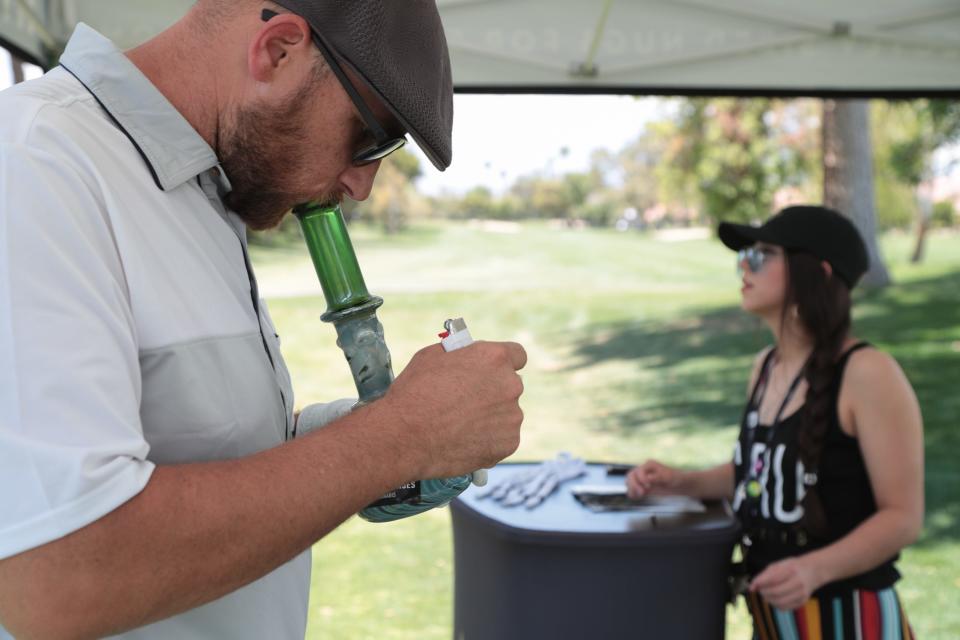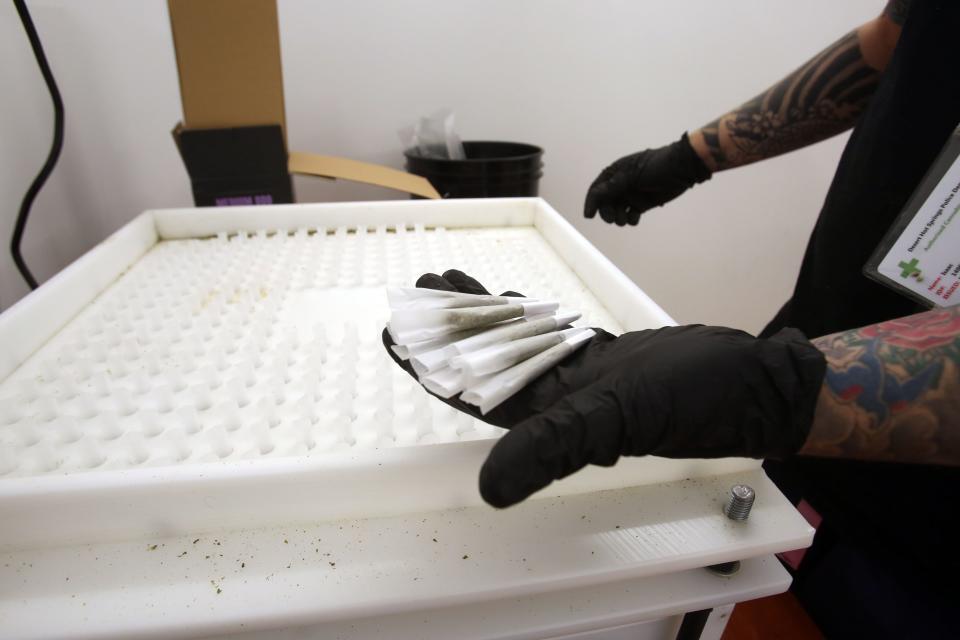Napa Valley, but for weed: Cannabis bill would tighten rules for claiming place of origin
Robert Steffano is proud of growing cannabis in southern Humboldt County, near the epicenter of California's famed Emerald Triangle weed country. He says he's been tending his crop there for 30 years.
But one day, Steffano, who owns Villa Paradiso Farms, got an email from a soil company he'd never heard of. Their brand name seemed to suggest they were from his corner of the county, too.
“I called them,” he said, "and they were from Colorado."
As California fine-tunes its cannabis laws, state lawmakers are turning their attention to a measure that aims to make sure California weed maintains the same whiff of quality as, say, California wine.
Senate Bill 185 would tighten existing rules that seek to prevent cannabis brands from claiming their weed is grown in a given place – say, the Emerald Triangle or Santa Cruz – unless it really is. Supporters said the measure will save consumers from being hoodwinked by knock-offs and might even boost sales for cannabis brands with authentic, homegrown bona fides. With any luck, the bill's supporters said, region-specific weed growers will one day enjoy the same cachet as Napa Valley vineyards.
CBD news: American Eagle is now selling ... CBD?
In candy too?: Hershey CEO says the company has ‘no plans at this point’
Wesley Hein, head of compliance and government affairs for the cannabis distributor Mammoth Distribution, said paying closer attention to place-of-origin claims is another sign that the state's legal cannabis market is maturing.
“Not that long ago," he said, "anybody could put anything on a label.”
The law right now
California law already allows licensed cannabis growers to get a county-of-origin designation if they grow all of their weed in one county. The law tasks the California Department of Food and Agriculture with setting county-of-origin standards.
And under current law, cannabis can't be marketed using the name of a California county unless it actually comes from that county.

In the same vein, the existing law gives CDFA the authority to set up a process for growers to establish "appellations of standards, practices, and varietals" – that is, designations that would tie their crop to a geographic area other than a county.
But in contrast to the county-of-origin designations, the existing law doesn't explicitly prohibit growers from misusing appellations.
Hang on, what's an appellation?
An appellation is a legal classification best known for its use in the wine industry, in which appellations refer to specific geographical areas where wine grapes are cultivated. They might also have to do with specific cultivation methods and grape varietals.
Michael Katz, the co-founder and CEO of the Emerald Exchange, which promotes cannabis products from northern California, said California's cannabis appellation system ought to recognize local differences in microclimate, growing practices and native soil, putting a spotlight on outdoor cultivators who work without environmental manipulation.
Appellations of origin wouldn't necessarily reflect existing political boundaries.
Steffano at Villa Paradiso Farms, for example, has already designed a logo for an appellation of origin that he'd like to see applied to his sub-region, which he calls Palo Verde. Rather than be confined inside Humboldt County alone, the appellation would cover an area that crosses into three different counties.
What SB 185 changes
As with the county of origin restrictions, growers would be forbidden from marketing their products using an appellation of origin, or a name that sounds similar, unless their products actually meet their area's appellation requirements.
The bill, authored by Senator Mike McGuire, also clarifies some language about the state's plan to establish an organic certification program for cannabis.
What appellations could mean for longtime growers
On the one hand, said Steffano, if an out-of-town brand is trying to piggyback on the reputation of Humboldt cannabis, it's proof of the region's excellent reputation.
On the other hand, he added, putting a Humboldt label on a non-Humboldt product is dishonest.
“We’re pretty protective of what we have here," he said. "I don’t like it when someone lies. That’s not authentic.”
That's one reason why Steffano supports efforts to create an appellation for his neighborhood, the region where Humboldt, Mendocino and Trinity counties meet.

Armando Gudiño, a policy manager for the nonprofit Drug Policy Alliance, said appellations will be especially important to longstanding growers in regions where cannabis cultivation predates Proposition 64, the vote that ushered in statewide cannabis regulations in California.
“I think they have a lot more of a vested interest in this,” he said, especially if they've been honing the same strain for years and want to protect its good name.
What local branding could mean for consumers
Gudiño sees appellations as a consumer protection issue, too. Companies using an appellation they haven't earned “undercut the original provider,” he said, “all the while fooling the consumer into thinking that they got something that they really didn’t.”
Adam Spiker, the executive director of the Los Angeles-based cannabis industry group Southern California Coalition, said that once it's legal to sell weed over state lines, consumers across the country will want to know they're buying genuine California cannabis, too.
After all, he said, "They’ve already been doing it illicitly for God knows how many years."
What local branding could mean for the Coachella Valley
Coachella Valley cannabis companies could find it useful to show off their local credentials, too.
Jocelyn Kane, the legislative director of the Coachella Valley Cannabis Alliance Network, said weed cultivators might one day tout their Coachella Valley-grown cannabis for the same reason craft breweries stress the close-to-home origins of their beers: It helps them to stand out next to big, multinational competitors.

“What we’re going to see in the long term is 'craft cannabis' and then ‘Budweiser’ cannabis,” she said. “Those craft brands are going to have to differentiate themselves and (a local appellation) is one way to do it. … There’s going to be this need to say, ‘Why’s this brand better than this other brand?’”
Plus, she said, tourists in the Coachella Valley will want to do “what the locals do” – and will gravitate to local weed brands.
Paying homage to Humboldt
Ellis Smith knows some people judge him for his product's name.
Smith is the founder of American Cannabis Company. The company owns SoHum Living Soils – the soil brand named after southern Humboldt County, which California cannabis grower Robert Steffano was surprised to learn was based in Denver.
“They feel like I don’t have a tie to it, I don’t have a connection to it," Smith said of his critics.
But Smith said the brand name isn't meant as a marketing gimmick. He intended it to be a tribute, he said, to the people who taught him the soil recipe when he worked in the Garberville-area cannabis business during the 2000s. He first picked up the term "SoHum" by listening to local hip-hop artists, he said.
“I knew, too, that the name would be catchy,” he said.
Amy DiPierro covers business and real estate for The Desert Sun in Palm Springs. Reach her at amy.dipierro@desertsun.com or 760-218-2359. Follow her on Twitter @amydipierro.
This article originally appeared on Palm Springs Desert Sun: Calif. bill aims to tighten rules on place of origin in weed business

